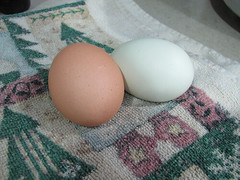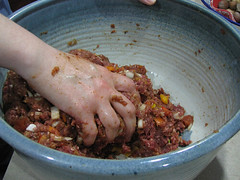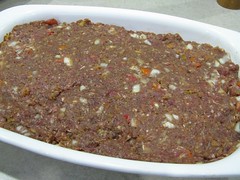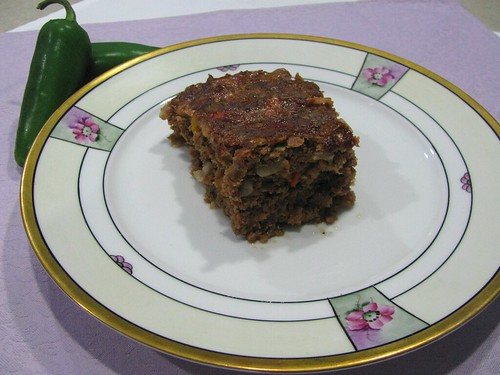I often see people who are advocating that we stop eating animal products tie that argument up into "environmentally friendly" and "sustainable" arguments. The arguments are flawed though, in so many ways.
Let's start with this, the fact that a single large ruminant will feed a single person for a while, and I mean a long while. The average weight of meat obtained from a single slaughtered cow is about 500 lbs. If you ate a pound of meat a day (which is a LOT of meat), then it would take you 500 days to eat the whole cow. That's over a year and a half of food, and it took only one cow. Say you only eat the beef for dinner, having eggs for breakfast for example, and you consume a half pound of meat, that cow will last a single person for more than three years.
One cow doesn't need very much grazing land, in good areas it's a cow per acre, unless you live in a very dry place. Not only that, but the cow doesn't till up the soil and drain it of vital nutrients.
It doesn't kill countless rodents by using combine machines for harvesting (or farmers attempting to exterminate them because they damage the crops). It doesn't require pesticides that run off and destroy the water and kill fish. The argument that cows take up land that could be used to grow crops is a stupid one. Yes, let's tear down all those trees and till up all the grass so you can eat soybean oil.
If we take into account, that if you eat a primarily meat based diet, like the Inuit, you have no need of vegetables, fruit or grains, then you will by extension use less resources and less land than if you eat the standard American diet, or even a vegetarian or vegan diet. It is no accident that people who eat Atkins say that they consume less food. They do consume less food, because their body is getting everything it needs from the small amount of food they're eating. You cannot consume enough grain to get all of the essential amino and fatty acids that you need. But a single 6oz steak with fat on it has almost everything your body needs to function. We evolved to eat meat primarily. Our brains developed into what they are because of saturated animal fat. Your metabolism doesn't give one iota about your "ethics".
If you eat a vegetarian or vegan diet, you are forced to eat a wide variety of food to try to obtain all of the nutrients necessary for you body to function, and even then most who try such diets are forced to take supplements or they get very sick. Even some who take supplements cannot remain on such diets because it damages their health.
Look at Gwyneth Paltrow. She's in her 40s and has osteopenia probably because she was a vegan.
Another thing is, I'm sure most vegetarians and vegans try to buy their food locally (or say they would like to), but depending on where you live, this could be impossible for most of the year. You're not going to find fresh fruits and vegetables in the middle of winter in most parts of the country. This therefore requires the shipping long distances of food (and vitamin supplements LOL). This is not a sustainable model for the environment. Do you know how much diesel a single tractor-trailer truck uses to travel across the country? I used to drive one, and for 600 miles of driving I would go through about a hundred(!) gallons of diesel. That's
one truck. Not to mention jet fuel usage for fruits and vegetables that come from outside the country because it's too cold to grow them here in the winter.
So, how much land would it take to feed someone a vegan diet for a year and a half? The argument is, not very much. And that may be true.
IF you lived out in the country, in a hospitable environment, and could grow your own food, it wouldn't take a lot of land to feed one person. Of course, you've got to get your vitamin supplements from somewhere >_<
You would also have to hope that the crops did good every year, and unless you're using pesticides, they may not do very well, and you would have to can enough of your crop for the winter. One bad year though, with floods, or bugs that eat all your plants, or no rain, and you'd better pray there's a grocery store nearby. Is this model applicable to most of the people in this country? Not no, but hell no. Most of the people who advocate eating vegetarian or vegan live in cities. Where the hell are they going to grow crops, on 5th Avenue? I mean, seriously?
We eat primarily venison, nearly every day for dinner, and even here in the Texas Hill Country, where the deer are small (about 38 lbs of meat on a doe after butchering), three adult does will typically last four adults for the entire year, and then some. And guess what, no fuel was consumed by any tractor-trailer to bring that food to us. We got it from our backyard. And that's another thing that pisses me off, though it is perhaps tangential to this argument, and that is that city-dwellers are somehow more "green" friendly than we are. Whatever someone in the city eats, whether it be meat or veggies, it has to be trucked in.
I insist that agriculture is the single worst thing that has ever happened to this planet. It allows for an artificially induced increase in population to a point that is unsustainable. From a historical point of view, it brought about patriarchy, but that's an entire other post all together. Eventually when crops no longer flourish because the soil has been over-used, there are famines. In addition to this, advocating commercial agriculture to feed everyone is supporting Corporations like Monsanto, whether you realize it or not. Monsanto loves vegans, they want all of us to be vegan so we'll buy their soybean derived products.
So, you want to be vegan? More power to you. Go for it. But here's a suggestion. Shut the hell up about it. It's not eco-friendly by default. It's not "the only way." It's not even a good way in my opinion. But it's a free country and if you want to do it, feel free. When you wreck your health, don't whine to me about it. I don't want to hear it. I'll probably just say I told you so. And don't tell me what to eat, and don't bother posting links to slaughterhouses run by some bad apples. I hate commercial farming, so of course I hate commercial cattle raising. That is not where most of my meat comes from, so you want something done about it? Write your congressman. I'm not an elected official and can't do squat about it. I don't come to your blog and tell you that paleo is more eco-friendly. That would be a waste of my time, because you're so caught up in yourself that you wouldn't consider it. I kill my own deer and know what it looks like to butcher one. Do you know where your food comes from? Unless you're hunting, buying from a farm down the street, or growing your own, Monsanto or some other Corporation is probably providing your food.
Angry at what I've written? Don't choke on your soybean oil.







